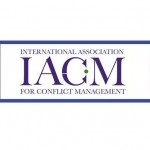 The 2013 Conference of the International Association of Conflict Management (IACM) is being held in Tacoma, Washington this year from June 30-July 3. Eight members of the ICCCR/AC4/NECR Community are planning on attending and presenting updates on their science and practice.
The 2013 Conference of the International Association of Conflict Management (IACM) is being held in Tacoma, Washington this year from June 30-July 3. Eight members of the ICCCR/AC4/NECR Community are planning on attending and presenting updates on their science and practice.
Abstract:
The proposed roundtable discussion addresses one of the pervasive problems in conflict research: The (lack of) links between micro or small group and macro or collective level research. We propose to briefly describe the advantages and disadvantages of both micro and macro research, followed by an in-depth discussion of problems in linking the two, and possibilities to overcome these problems. Furthermore, we will discuss the more practical side of these issues and focus on the question of transferring knowledge from micro level to macro level and vice versa.
Putting the Peaces Together: Introducing a Situated Model of Mediation in Social Conflict Peter Coleman, Nora El Zokm, Christianna Gozzi, Katharina Kugler, & Kyong Mazzaro
Abstract:
This project aims to identify the most fundamental aspects of conflict situations that determine differences in mediator decisions, strategies and tactics. It involved an extensive survey of the literature on mediation, which included meta-models and empirical research published over the last 10 years, where we identified the most common situational factors found in published conceptual and empirical models. We then build on 48
the literature review to present a situated model of mediator behavior, which locates mediators’ decisions and actions within the context of four fundamental dimensions of conflict mediation, and emphasizes the importance of the mediator meta-competencies of adaptivity, optimality and systemic agency in achieving constructive outcomes. The ultimate objectives of this study are to bring conceptual coherence and parsimony to the theoretical understanding and empirical study of mediation, to create an assessment instrument in order to measure mediator’s strategies, meta-competencies and general efficacy in mediations of all types, and through the development of the model and assessment, contribute to the discourse on international standards and metrics of best practices in mediation.
Polarization or dialogue? Regulatory focus and anonymity in online communication Nicholas Redding, Christine Chung, & Peter Coleman
A model on the dynamics of (in)justice, change and sustainable peace Peter Coleman & Kyong Mazzaro
The Ecological Correlates of Armed Conflict: A Geospatial and Spatial Statistical Approach to Conflict Modeling Joshua Fisher
Abstract:
Few studies focus explicitly on the ecological relationships that determine where violent conflict physically occurs in the world. I employ a spatially explicit approach to study the environmental and ecological correlates of conflict by dividing the earth into a grid of 100 x100 km cells, and overlaying spatial datasets for multiple ecological characteristics. I code each cell for the occurrence of conflict each year between 1991-2004, and include controls for political and economic characteristics and for spatial autocorrelation. Using logistic regression, I run models for territorial conflict, governance conflicts, and a combined conflict model. I find that the political and economic controls are the only covariates that significantly correlate with the occurrence of conflict in the combined conflict model. Models that explore territorial conflict and governance conflict independently show that each type of conflict strongly correlates with a distinct ecological profile.
Making Better Social Worlds: Interrupting Patterns of Destructive Conflict Beth Fisher-Yoshida
Abstract:
As we intervene in conflicts, our own or as third parties, we need a variety of approaches to reframe conflicts to work toward constructive resolution. Coordinated Management of Meaning (CMM) is grounded in social constructionism and offers taking a communication perspective. Our relationships are made in communication and the quality of our relationships directly impacts the quality of the social worlds we are making, which is to make better social worlds. CMM uses concepts, tools and models to unpack complex conflicts. This workshop has three parts: Part one is a brief foundation of CMM; part two is a sharing of one or two client interventions in a community and organization; in part three participants apply these concepts, tools and models to their own conflict situations they are personally facing or as a third party intervener. There will be guided reflection at the conclusion for participants to capture their learning.